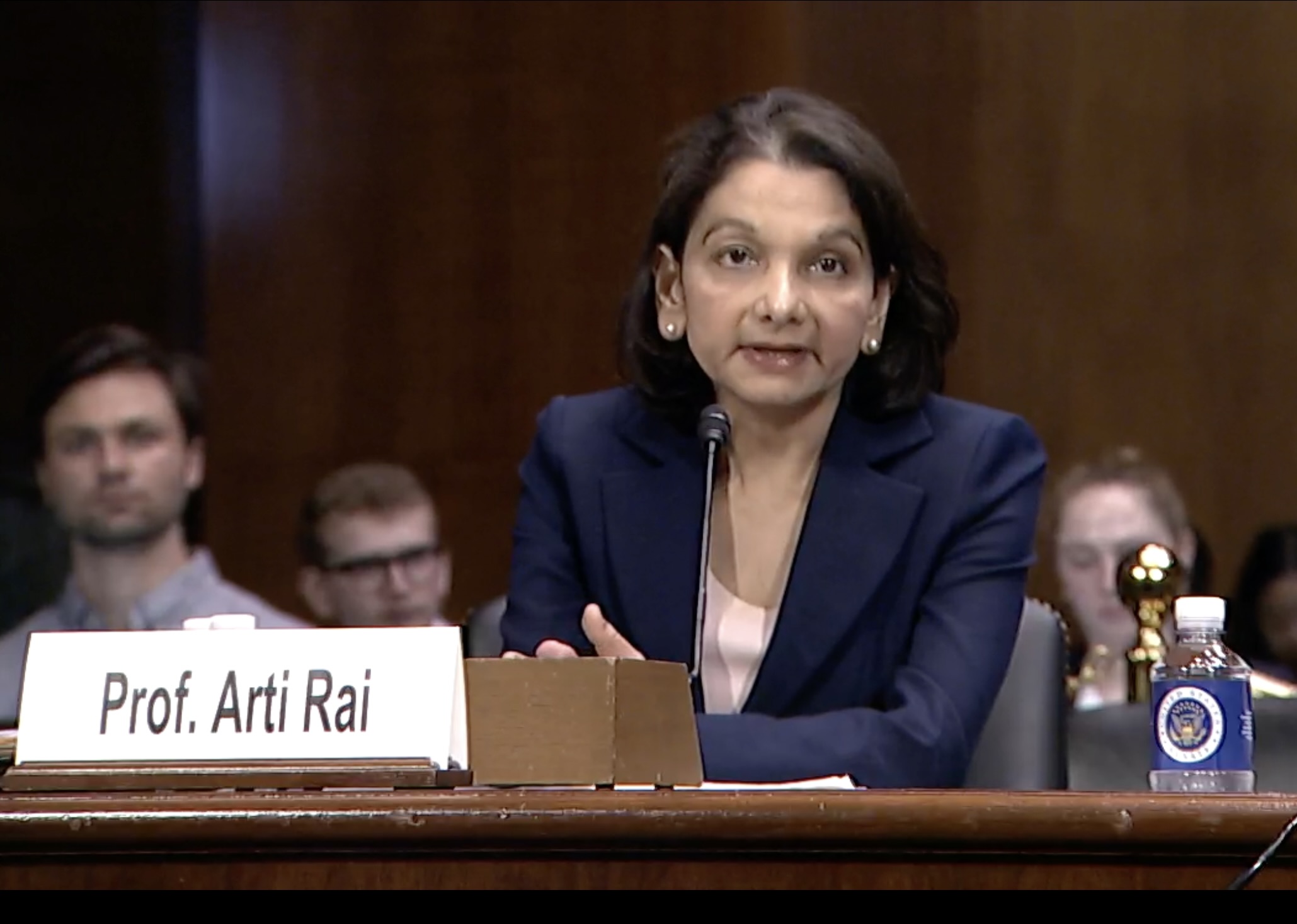Rai testifies before Senate Judiciary Committee examining high prices for prescription drugs
The hearing focused heavily on the role of the patent system in the high cost of prescription drugs for U.S. consumers.
Elvin R. Latty Distinguished Professor of Law Arti K. Rai testified before the Senate Judiciary Committee on how to improve competition, innovation, and patent quality in the prescription drug market.
Rai told senators that while incentives provided by properly granted patents are important for drug discovery and development, there is substantial evidence that poor-quality patents are impeding competition, raising prices for consumers without promoting innovation.

“Fortunately, dubious validity can be addressed through surgical responses,” she said, expanding on three recommendations during the full committee hearing on May 21 titled “Ensuring Affordable & Accessible Medications: Examining Competition in the Prescription Drug Market.”
The hearing focused heavily on how the pharmaceutical industry contributes to high prescription drug prices by exploiting the U.S. patent system to maintain market exclusivity for popular, high-profit medications such as Humira.
Tactics such as filing multiple patents that are not innovative or related to a medication’s efficacy, such as patents on a new drug delivery method, create a “thicket” that can delay the entry of lower-cost and generic versions to the market, Rai and other witnesses testified.
Rai, co-director of the Center for Innovation Policy at Duke Law, noted that she has worked on drug competition issues for several decades, both as an academic and as an advisor to the executive branch. In 2021 she served as senior advisor on innovation law and policy issues to the Department of Commerce’s Office of General Counsel, and from 2009 to 2010 she headed the Office of Policy and International Affairs at the U.S. Patent and Trademark Office (USPTO).
Rai is currently working with the center’s senior fellow, Dr. Osmat Jefferson, on a one-year study funded by Arnold Ventures of a group of biologics that make up 2% of prescriptions but account for nearly half of all U.S. spending on prescription drugs.
Committee Chair Dick Durbin opened the hearing by noting that U.S. consumers pay the highest prices in the world for prescription medications – more than twice the price that Germans pay for the cancer drug Keytruda, for example, and more than four times the price Canadians pay for Jardiance, a heavily-advertised medication for Type 2 diabetes.
In 2022, drug manufacturers raised the prices of more than 1,200 medications by an average 32% – four times the rate of inflation, he noted.
Rai provided three narrowly tailored solutions to address patents of dubious validity: improving communication and coordination between the U. S. Patent and Trademark Office (PTO) and the FDA; limiting patents that are obvious variations of patents that have been determined to be invalid; and ensuring the continued vitality of the Patent Trial and Appeal Board, which she said “is doing an excellent job and does not need to be interfered with.”
While legislators can help curtail patent abuses by passing new laws, federal agencies could do much right now simply by using their current powers, Rai said.
“So why don’t they do it?” asked Louisiana Sen. John Neely Kennedy.
“I think that Congress doesn’t adequately push them to do it,” Rai replied.
In response to a question from Hawaii Senator Mazie Hirono, Rai said more information-sharing and collaboration between the FDA and PTO would help ensure that every patent in the Orange Book, the FDA’s list of approved pharmaceuticals, is properly listed.
“This is a gap in the system that has existed for decades and it’s really unclear to me why this gap has not been filled,” she said.
Rai applauded a provision in the 2022 Inflation Reduction Act that allows Medicare, for the first time, to negotiate prices directly with drug companies for ten brand-name drugs, including Jardiance, Xarelto, Januvia, and Stelara. Negotiated prices take effect in 2026.
“I think the Inflation Reduction Act is one of the most important patent reforms of the 21st century,” Rai said.
“It finally places a time limit, at least for Medicare, on how long you can extend an old drug. Which means that you have to come up with new drugs, truly new drugs. That is a game changer, it seems to me. … It spurs innovation to prevent patent abuse.”
In addition to Rai, the witness panel included William Feldman, MD, a physician at Brigham and Women's Hospital; David Mitchell, president and founder of Patients for Affordable Drugs; Adam Mossoff, professor at George Mason University’s Antonin Scalia Law School; and Jocelyn Ulrich, vice president, policy and research at Pharmaceutical Research and Manufacturers of America (PhRMA).
The hearing can be viewed in its entirety online (coverage begins at 00:15:55.) Read Rai’s written testimony here.